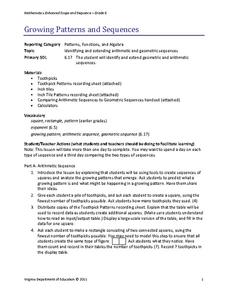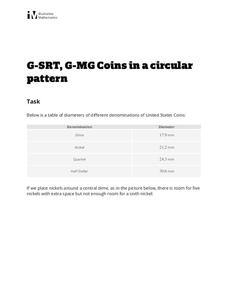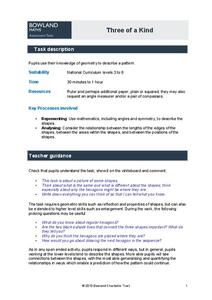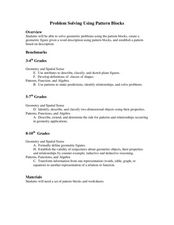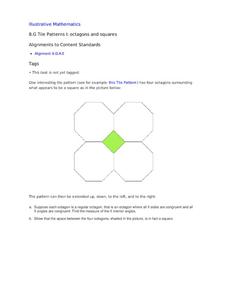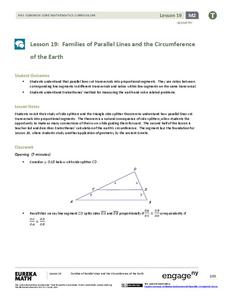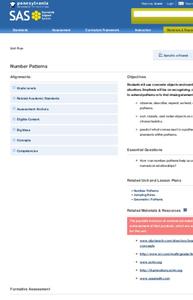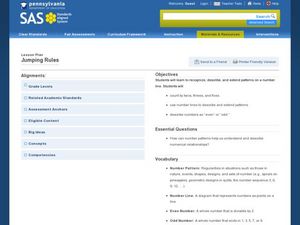Curated OER
Patterns
Fifth graders recognize shape and number patterns. In groups, 5th graders use strategies to find patterns. They extend the patterns and give explanations as to how they found the pattern. Students use the computer and the hundreds...
Curated OER
What's the Best Deal?
Young scholars explore number sense by solving consumer math problems. In this pattern identification lesson, students analyze a list of numerical and geometric patterns while predicting the future outcome. Young scholars utilize...
Virginia Department of Education
Growing Patterns and Sequences
Learners explore, discover, compare, and contrast arithmetic and geometric sequences in this collaborative, hands-on activity. They build and analyze growing patterns to distinguish which kind of sequence is represented by a set of data...
Inside Mathematics
Conference Tables
Pupils analyze a pattern of conference tables to determine the number of tables needed and the number of people that can be seated for a given size. Individuals develop general formulas for the two growing number patterns and use them to...
Illustrative Mathematics
Coins in a Circular Pattern
What starts as a basic question of division and remainders quickly turns abstract in this question of related ratios and radii. The class works to surround a central coin with coins of the same and different values, then develops a...
Curated OER
Geo-Wrap Vests
First graders use geometric shapes to create and extend patterns. Students read a book and view African garments. They identify patterns in the garments. Students create and decorate a paper vest with geometric patterns.
Bowland
Three of a Kind
One is chance, two is a coincidence, three's a pattern. Scholars must determine similarities and differences of a regular hexagon undergoing dilation. They look at lengths, angles, areas, and symmetry.
National Gallery of Canada
Tantalizing Tessellations!
Examine repeating and intricate patterns with a study of M.C. Escher and a related art activity. Pupils view and discuss the artwork before creating their own tessellating patterns. Step-by-step instructions for creating a template are...
Curated OER
Representing and Extending Patterns
Learners explore repeating and growing patterns. In this patterns lesson, students describe patterns, explore changing patterns and match patterns. Learners participate in online activities and read books that show patterns in nature and...
Curated OER
Problem Solving Using Pattern Blocks
Students use pattern blocks to create a figure that is described to them and establish a pattern based on the description of the geometric figure. In this pattern blocks lesson plan, students fill out shape and fraction worksheets.
Curated OER
Complete The Pattern
Students are introduced to various geometric and numeric patterns. In groups, they work together to determine the next object or number in the pattern. They record their answers on a worksheet and create their own pattern to give to a...
Curated OER
Patterns and Sequences
Sixth graders explore pattern recognition and sequencing. They create arithmetic and geometric sequences with colors, shapes, and numbers. Students write expressions of arithmetic sequences and geometric sequences to find the nth term.
Pennsylvania Department of Education
Extending Pattern Understandings
Students use shapes and manipulatives to demonstrate patterns. In this patterns lesson plan, students also break up patterns to identify a pattern unit.
Curated OER
Investigation-How Many Toothpicks?
Seventh graders use toothpicks to investigate a series of designs and identify patterns. Data is organized and analyzed using tables and graphs, and students make generalizations using algebraic expressions.
Curated OER
Design Explorations: Frieze Patterns
Students will explore frieze patterns. A frieze pattern is a mathematical concept to classify designs on two-dimensional surfaces, which are repetitive in one direction, based on the symmetries in the pattern. They will explore examples...
Curated OER
Tile Patterns I: Octagons and Squares
This can be used as a critical thinking exercise in congruence or as a teaching tool when first introducing the concept. Four octagons are arranged in such a way that a square is formed in the middle. With this information, geometry...
EngageNY
Families of Parallel Lines and the Circumference of the Earth
How do you fit a tape measure around the Earth? No need if you know a little geometry! Pupils begin by extending their understanding of the Side Splitter Theorem to a transversal cut by parallel lines. Once they identify the proportional...
Curated OER
Identifying Patterns
Students investigate the elements of a pattern. In this geometry instructional activity, students identify different shapes in a pattern and discover which shapes are missing in order to extend it. Students create their own patterns...
Curated OER
Investigation: Area of Geometric Shapes
Fourth graders explore geometry by utilizing pattern blocks. In this pattern lesson, 4th graders analyze two separate pattern block shapes and discuss which one is bigger and smaller. Students collaborate in small groups to create...
Curated OER
Linear Patterns in Data
Eighth graders extend their learning of graphing linear equations and are introduced to connecting patterns in tables and graphs to represent algebraic representations. They then determine patterns and extrapolate information from these...
Curated OER
Number Patterns
First graders use manipulatives to complete and extend patterns. In this patterns lesson, 1st graders complete a pattern with a missing element, extend a pattern, and sort objects by characteristics.
Curated OER
Jumping Rules
First graders practice identifying number patterns. In this basic patterns lesson, 1st graders use a large number line and jump to certain numbers to create, identify or extend a pattern. This lesson includes a script to guide the teacher.
Curated OER
Investigation Area of Geometric Shapes
Fourth graders use triangle paper to design patterns using geometric figures and find the areas of those figures by counting units. Students are assessed by determining which figure has the greatest area and explaining their reasoning.
Curated OER
Parade of People
Students explore making patterns. In this patterns activity, students make patterns from the groups they are put in. Students can use items from around the room to make their patterns




